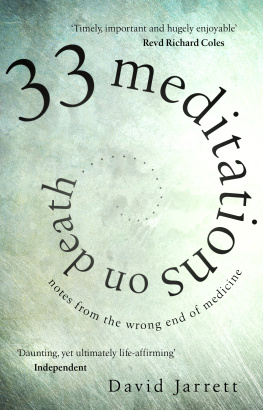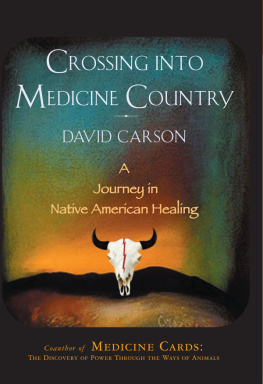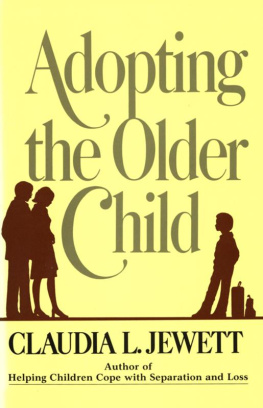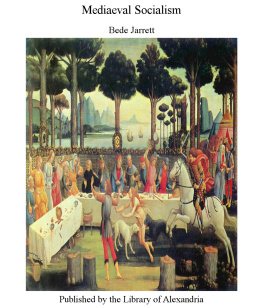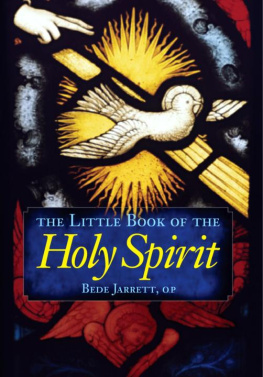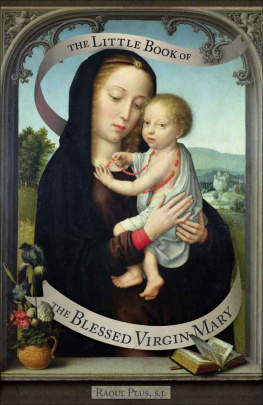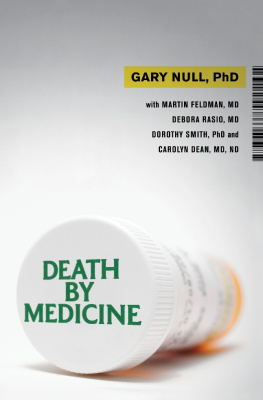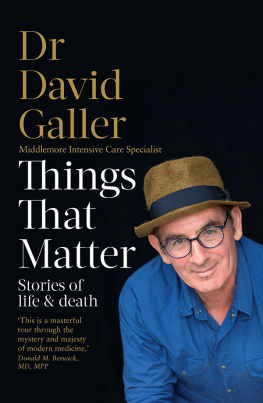David Jarrett - 33 Meditations on Death: Notes from the Wrong End of Medicine
Here you can read online David Jarrett - 33 Meditations on Death: Notes from the Wrong End of Medicine full text of the book (entire story) in english for free. Download pdf and epub, get meaning, cover and reviews about this ebook. year: 2020, publisher: Transworld, genre: Non-fiction. Description of the work, (preface) as well as reviews are available. Best literature library LitArk.com created for fans of good reading and offers a wide selection of genres:
Romance novel
Science fiction
Adventure
Detective
Science
History
Home and family
Prose
Art
Politics
Computer
Non-fiction
Religion
Business
Children
Humor
Choose a favorite category and find really read worthwhile books. Enjoy immersion in the world of imagination, feel the emotions of the characters or learn something new for yourself, make an fascinating discovery.
- Book:33 Meditations on Death: Notes from the Wrong End of Medicine
- Author:
- Publisher:Transworld
- Genre:
- Year:2020
- Rating:4 / 5
- Favourites:Add to favourites
- Your mark:
- 80
- 1
- 2
- 3
- 4
- 5
33 Meditations on Death: Notes from the Wrong End of Medicine: summary, description and annotation
We offer to read an annotation, description, summary or preface (depends on what the author of the book "33 Meditations on Death: Notes from the Wrong End of Medicine" wrote himself). If you haven't found the necessary information about the book — write in the comments, we will try to find it.
David Jarrett: author's other books
Who wrote 33 Meditations on Death: Notes from the Wrong End of Medicine? Find out the surname, the name of the author of the book and a list of all author's works by series.
33 Meditations on Death: Notes from the Wrong End of Medicine — read online for free the complete book (whole text) full work
Below is the text of the book, divided by pages. System saving the place of the last page read, allows you to conveniently read the book "33 Meditations on Death: Notes from the Wrong End of Medicine" online for free, without having to search again every time where you left off. Put a bookmark, and you can go to the page where you finished reading at any time.
Font size:
Interval:
Bookmark:


David Jarrett has been a doctor for over forty years, thirty of them as an NHS consultant in geriatric and stroke medicine. He is a clinician, teacher, examiner and former medical manager with extensive experience of frailty, death and dying, and the modern worlds failure to confront these realities. He has also worked in Canada, India, Africa and the USSR. He is married with two children and lives in Hampshire during the week and in London at weekends.
To Sharno
To paraphrase Miles Davis on Louis Armstrong:
No her no me.
Oh death, wont you spare me over for another year?
Traditional American song
T HE ANCIENT G REEKS knew a thing or two about the human condition. Anyone these days in full-time employment can sympathize with Sisyphus as he struggles to roll his stone up a hill only for it to roll back down again. We can take some comfort from the fact that our labours arent for all eternity. The sword of Damocles, hanging above our heads by a single hair, is as good a symbol of the precariousness of human existence as any man has created. There are many tragic humans in Greek mythology, all eventually reduced to the cartoons of the gods. A lesser character in this pantheon of unfortunates is the Trojan prince Tithonus. His lover Eos, goddess of the dawn, asked the gods to give him eternal life, a wish they duly granted, but she failed to ask for eternal youth. He was therefore cursed to live for ever, getting feebler and more decrepit without ever having the merciful relief of death.
A lot has been written on death by palliative care physicians. These doctors know a huge amount about helping people to die without distress and their hospices and community services are rightly held up as the gold standard for end-of-life care. But and this is a big but in the UK only about 5 per cent of those dying do so in a hospice. Half of us die in hospitals and a quarter in old peoples homes. Only one in five of us dies at home. When someone enters a hospice the diagnosis is known, often end-stage cancer or a neurodegenerative disease, and the patient and their family have had some time to come to terms with their inevitable fate. This book is about all the other deaths. Sudden deaths, dementia, frailty, strokes and all the difficult-to-predict deaths that most of us, thankfully usually in old age, will eventually face.
The Danish philosopher Kierkegaard stated that life can only be understood backwards but must be lived forwards. I have now worked as a physician and geriatrician for over forty years and have been looking backwards for some time trying to make sense of where I or, more realistically, medicine has come from and on what path we are heading. There is no frontier medicine in this book. No complex brain surgery and no insertion of artificial hearts that cost as much as a Ferrari. The most expensive thing Ive ever put into a patients body is an intravenous cannula which might have set the health service back about a quid. The ongoing day-to-day, month-to-month and year-to-year care of the frailest of the frail is the work that I do and have always done.
The limits of resources in health provision are much debated, especially around the time of general elections. The limitations of medicine are rarely openly debated. I hope to touch on these failings of modern medicine an area doctors usually avoid discussing, at least in public. There seemed to me to be a need to make sense of the modern world and its attitude to death, particularly to death in the frail elderly, the fastest-growing population in the world, and not just the developed world.
This is a plea for society to talk more about death and develop a realistic understanding of ageing, dementia and frailty. For the first time in human history younger people are looking at the enfeebled lives of their elders with some degree of dread. The impact of caring for parents and in-laws may now extend over decades. This is a call to arms for all of us to prepare and share more radical plans for our futures and perhaps in old age relinquish some of our considerable financial and electoral power.
I once read that the only subjects worth writing about are sex and death. I cannot promise much sex in this book. I can promise you a lot of death. Death in all its forms. Death is sometimes tragic and sometimes comical. It can be heroic or pitiful. It can be accepted as inevitable by the dying and their loved ones or it can be raged against and seen as a failure of medicine and science. The ethical and legal dilemmas recounted will reveal no clear-cut path through the muddy swamp that is real-life dying and real-life medicine. Most of the deaths in this book are in the very debilitated and elderly who, sadly, are fighting a losing battle a battle against nature that society and medicine itself have difficulty acknowledging or confronting head on. This book is about that battle.
All the birds are leaving, but how can they know its time for them to go?
Fairport Convention
O N 14 S EPTEMBER 2009 Keith Floyd, the television chef and all-round bon viveur, went for lunch at the Hix Oyster and Fish House in the beautiful town of Lyme Regis in Dorset. He started with a Hix Fix, comprising champagne with a cherry soaked in apple eau-de-vie. This was followed by a glass of white wine a 2006 Pouilly Vinzelles Burgundy with the oysters and potted shrimps. To accompany his main course he had a bottle of red wine, a Perrin et Fils Nature Ctes du Rhne 2007, which no doubt complemented the red-legged partridge with bread sauce. Pudding was a pear cider jelly. This being Keith Floyd, the meal was interspersed with a few cigarettes. He was feeling good as he had recently been given the all-clear from bowel cancer. He went home and, later that evening, sat down to watch a television documentary. He told his partner he did not feel well and promptly died.
This is the kind of death we all long for. The nature of his demise inspired Eddie Mair on Radio 4 to ask listeners for examples of other good deaths. It was heartening to hear stories of much-loved friends in their old age cheerily waving goodbye, getting on their bicycles and pedalling off down the road only to end up dead in a hedge. The Bing Crosby option. Crosby, the celebrated actor and crooner, famously finished playing golf and dropped down dead yards from the clubhouse. In my opinion his death could only have been improved upon if he had made it to the bar first.
Those brought up as Catholics, as I was, will be aware of the concept of a good death. Its there in the catechism, the Catholic instruction manual. Occupy yourself with thoughts of death until you fall asleep. One can even pray to St Joseph in the hope that he will intercede when the time comes.
I was in the geriatric day hospital at Petersfield Community Hospital when there was a frantic knock on the door one morning. Dr Jarrett, someone has just collapsed in the corridor cardiac arrest! A cardiac arrest is the only event where a doctor or nurse can drop everything and leave their patient without deference or apology. In the corridor lay a tall old lady surrounded by defibrillators, bags of drugs and intubation tubes. Nurses were struggling to find a vein to insert a cannula. External cardiac compressions and mouth-to-mouth resuscitation were in full swing. I am hopeless at any physical tasks. I could no more be a surgeon than a tightrope walker. It is wise sometimes when chaos reigns to step back. The team were doing all the right things.
Next pageFont size:
Interval:
Bookmark:
Similar books «33 Meditations on Death: Notes from the Wrong End of Medicine»
Look at similar books to 33 Meditations on Death: Notes from the Wrong End of Medicine. We have selected literature similar in name and meaning in the hope of providing readers with more options to find new, interesting, not yet read works.
Discussion, reviews of the book 33 Meditations on Death: Notes from the Wrong End of Medicine and just readers' own opinions. Leave your comments, write what you think about the work, its meaning or the main characters. Specify what exactly you liked and what you didn't like, and why you think so.

